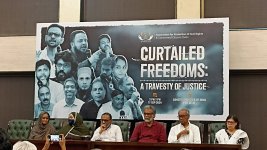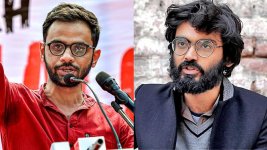In the world’s largest democracy, the rule of law is often invoked as a pillar of national identity. Yet, within this very system, hundreds of citizens — activists, students, journalists, lawyers — languish in jails without conviction, detained not for crimes proven, but for dissent expressed. These individuals are often referred to as "political prisoners", a term the Indian state refuses to officially recognize, but which increasingly defines the paradox of freedom in modern India.
This raises a fundamental question: When dissent is criminalized and prisons become political tools, can we still claim fidelity to constitutional democracy?
This legal architecture enables what many scholars call “lawful illegality” — the use of law not as a shield for rights, but as a sword of repression.
Similarly, during the anti-CAA protests, student activists like Umar Khalid, Safoora Zargar, and Devangana Kalita were detained under UAPA, accused of “conspiracies” against the state. Courts have found little substantive proof, yet they remain caught in the slow grind of India's legal machinery.
This weaponization of law suggests not just political vendetta, but a systemic erosion of civil liberties.
Bail — once considered a constitutional right — has become a luxury for the vocal. The Supreme Court’s own dictum that “bail, not jail” is the norm is increasingly applied selectively.
In such a climate, pre-trial detention becomes the punishment itself, especially for those without political clout or media backing.
This recalls George Orwell’s warning: “If you want a vision of the future, imagine a boot stamping on a human face—forever.”
The tragedy is not only that the boot exists — but that we have normalized its presence, cloaked in legal justifications, national security arguments, and media propaganda.
And so, the true measure of a democracy is not how it treats the loyal, but how it handles the defiant.
India must choose: rule of law or rule by power. For in that choice lies the fate of the republic.
This raises a fundamental question: When dissent is criminalized and prisons become political tools, can we still claim fidelity to constitutional democracy?
I. Who Are Political Prisoners — And Why the Denial?
Legally, India does not acknowledge the category of "political prisoner" as separate from other detainees. Yet, across regimes, we see a recurring pattern: individuals who speak truth to power — whether through protests, writings, or organizing movements — are charged under extraordinary laws like:- Unlawful Activities (Prevention) Act (UAPA)
- National Security Act (NSA)
- Sedition (Section 124A IPC)
- Public Safety Acts at the state level
This legal architecture enables what many scholars call “lawful illegality” — the use of law not as a shield for rights, but as a sword of repression.
II. Case Studies: From Bhima Koregaon to CAA Protests
The Bhima Koregaon case is a chilling illustration. Several intellectuals — Sudha Bharadwaj, Father Stan Swamy (who died in custody), Gautam Navlakha, and others — were arrested under UAPA for allegedly inciting violence and having Maoist links. Years later, the evidence remains contested, trials are pending, and most of them have not been granted bail.Similarly, during the anti-CAA protests, student activists like Umar Khalid, Safoora Zargar, and Devangana Kalita were detained under UAPA, accused of “conspiracies” against the state. Courts have found little substantive proof, yet they remain caught in the slow grind of India's legal machinery.
This weaponization of law suggests not just political vendetta, but a systemic erosion of civil liberties.
III. Judiciary: Sentinel on the Watchtower or Silent Spectator?
In theory, the judiciary is the last refuge for liberty. But in many of these cases, courts have been hesitant to challenge the state narrative, often citing the seriousness of charges rather than the lack of evidence.Bail — once considered a constitutional right — has become a luxury for the vocal. The Supreme Court’s own dictum that “bail, not jail” is the norm is increasingly applied selectively.
In such a climate, pre-trial detention becomes the punishment itself, especially for those without political clout or media backing.
IV. The Crisis of Democratic Conscience
The presence of political prisoners in a democracy is not just a legal issue — it is a moral and philosophical crisis. When the state criminalizes ideology, the prison becomes a theatre of punishment for thought.This recalls George Orwell’s warning: “If you want a vision of the future, imagine a boot stamping on a human face—forever.”
The tragedy is not only that the boot exists — but that we have normalized its presence, cloaked in legal justifications, national security arguments, and media propaganda.
V. What Is to Be Done? Reclaiming Constitutional Patriotism
India’s freedom struggle was built by those whom the colonial regime called seditionists, agitators, and rebels. If we are to remain true to that legacy, we must reclaim the idea that dissent is not anti-national, but the highest form of patriotism.- Repeal or reform draconian laws like UAPA and sedition provisions.
- Restore judicial courage and emphasize constitutional morality over political expediency.
- Recognize political imprisonment as a systemic issue, not isolated legal episodes.
- Build civil society coalitions that fight for the rights of prisoners, monitor trials, and document abuses.
 Let’s Reflect:
Let’s Reflect:
- Can democracy survive without the right to dissent?
- Should preventive detention exist in peacetime?
- Is silence from the majority complicity in injustice?
Conclusion: The Nation Behind Bars
To speak of political prisoners is to confront a fundamental contradiction: that in a republic founded on freedom, freedom itself is in chains. If our laws cannot protect those who question power, then law becomes merely a façade — an ornament on the edifice of authoritarianism.And so, the true measure of a democracy is not how it treats the loyal, but how it handles the defiant.
India must choose: rule of law or rule by power. For in that choice lies the fate of the republic.


